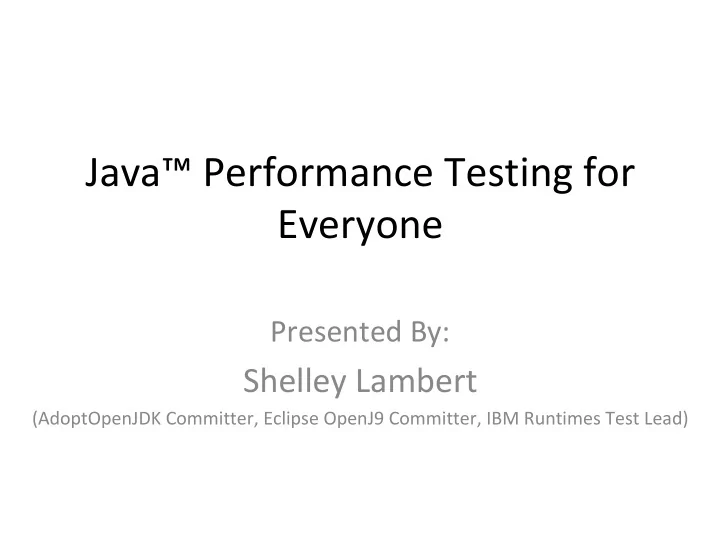

Java™ Performance Testing for Everyone Presented By: Shelley Lambert (AdoptOpenJDK Committer, Eclipse OpenJ9 Committer, IBM Runtimes Test Lead)
Who Am I? Various Roles Developer / Test Lead Development Manager Yoga Teacher tuneupfitness.com/teacher/shelley-lambert Chief Food Forester ottawafoodforests.com nanabushfoodforests.com
The Scope • Projects: Eclipse OMR, Eclipse OpenJ9, AdoptOpenJDK • Ensuring Free and Verified Java™ for the Community • 6+ Jenkins servers • 18+ platforms • 6+ versions, 4+ implementations • 7+ test categories -> 100,000’s of tests 18x6x4x100000 = ~43 million tests … nightly, around the world! • AdoptOpenJDK
Where to start with performance? • The story of Java performance – No single recipe (Many factors: JVM implementation, hardware, application design) – JVMs evolve, performance improves • JVMs “complex, intricate, subtle” • Wouldn’t it be great if it were simple? -XX:goFaster, -XX:useLessResources
The Intersection • Necessary – developers need to know if the code they write affects performance – currently using diverse set of tools and approaches, home- made scripts, duplication, lost learning opportunities • Impossible – measuring performance often stated as “too hard” to do Necessary Impossible
Defining the “Impossible” • What is performance testing? – Often called ”Experimental science” – “Testing if a system accomplishes its designated functions within given constraints regarding processing time and throughput rate.”* • Good performance? Speed, resources or a blend – Modern language runtimes care about many different metrics • Throughput, Startup Time, Ramp-up Time, Compile Time • Footprint – Average Resident Set Size – Compilation Memory Consumption – Peak Resident Set Size * Witteveen, Albert. Performance testing - a practical guide (Kindle Locations 176-177).
What to measure Metric name What to Constraints Inputs to vary measure? Throughput # of transactions time Latency Time for single # of transactions Workload (increases) transaction Capacity # of Throughput or latency Parallel load on the simultaneous system transactions Utilization Use of resources workload Efficiency Throughput/ utilization Scalability Throughput or Resources (added) capacity Degradation Latency or utilization Workload (increases) throughput Explicit or implicit ‘inputs’ to normalize: HW, OS, system setup
Basic Steps • Set a goal – which metric(s) to improve • Measure – but how? tools? • Adjust – apply your experiments • Measure again – how exhaustive? • Verify goal – did the metrics improve? enough?
AdoptOpenJDK Testing github.com/AdoptOpenJDK/openjdk-tests • The wildly different ‘fruit’, how to make them easily consumable “Consolidate and Curate” testkitgen system openjdk external jck perf functional junit & testNG, Assorted STF jtreg javatest others benchmarks cmdlinetester
Performance Benchmarks (Large-scale and Microbenchmarks at AdoptOpenJDK) perf Assorted benchmarks acme-air libertydt spark odm bbench idle jmh Microbenchmarks … … … … Large scale
Introducing github.com/AdoptOpenJDK/openjdk-test-tools • PerfNext - configure, tune and launch performance benchmarks. • Test Results Summary Service (TRSS) - summarize and visualize different test results including perf results, push different sets of test results to a DB, search test and compare results across different platforms, report on differences between jobs • Future services – result analytics, test generation, core analytics, bug prediction
Track the progress of benchmark runs and verify their output
TRSS – Performance Comparison
TRSS – Performance Comparison
TRSS – Regression Analysis 7 days 1 month All data
BumbleBench “Microbenchmarks Simplified” github.com/AdoptOpenJDK/bumblebench • Writing a good microbench with an optimizing JIT running your code is hard – are you measuring what you think you are measuring? • BumbleBench is a Java framework that provide a hook point to implement the benchmark payload • Framework provides the outer timing loop, scoring infrastructure, etc.
Conclusion • Perf is hard (not impossible) – High resource requirements for full-scale testing – Microbenchmarks difficult to write – Data is noisy and subject to interpretation • Building tools to make perf easier – TRSS / PerfNext / BumbleBench • AdoptOpenJDK git repos: openjdk-tests, openjdk-test- tools, bumblebench • Coming soon -> trss.adoptopenjdk.net • Open Collaboration leads to greater Innovation – “Innovation is creativity with a job to do.” – John Emmerling
Connect & Collaborate! Website Github Twitter adoptopenjdk.net AdoptOpenJDK/openjdk-tests @adoptopenjdk AdoptOpenJD K eclipse.org/openj9 eclipse/openj9 @openj9 eclipse.org/omr eclipse.org/omr @eclipseomr 8thdaytesting.com smlambert @ShelleyMLambert Upcoming Talks : Performance Testing for Everyone AdoptOpenJDK: Ensuring Free Java for the Community Fuzzy Plans and Other Test Integrations Shaking Sticks and Testing OpenJDK Implementations
Recommend
More recommend